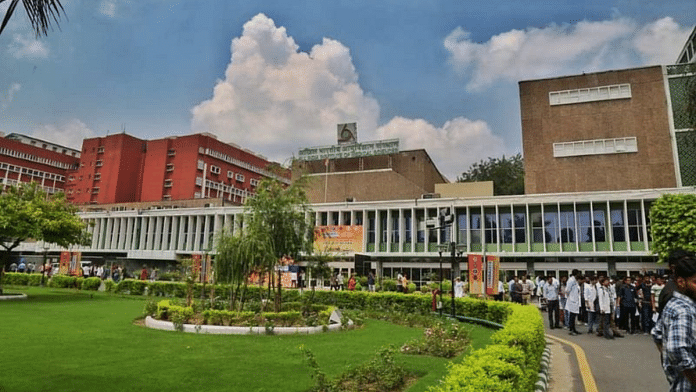New Delhi: A few weeks ago, the All India Institute of Medical Sciences, Delhi announced that it would be setting up a centre for transgender healthcare. Earlier this year, AIIMS became the first public hospital to conduct a successful lung transplant. There’s never been a day when AIIMS wasn’t in the news since its establishment in 1956 under an Act of Parliament. It began with an idea from India’s first health minister, Rajkumari Amrit Kaur of Kapurthala, while she was at her palace in Shimla. Over the decades, AIIMS has evolved to become the steel frame of India’s healthcare.
What was once a barren land, a space where doctors were scared to take a stroll, is now a bustling hub of emerging medical research, healthcare and technology—a testament to Kaur’s dream, said Dr M Srinivas, director of AIIMS, during a talk at the India International Centre on Saturday where he chronicled the institute’s legacy. It’s the first of a series of collaborations between AIIMS Delhi and IIC.
The event may have begun as a trip down memory lane, with rare photos including of Jawaharlal Nehru at the convocation, but it soon became a discussion on the state of healthcare in India, cyber attacks, and the role of AIIMS in framing policies.
“As the memories fade, these black and white pictures remind us of our ancestry, the genotyping of the institute. From then to now, we have continued our legacy of being number one,” Srinivas said.
Decentralisation
Today, AIIMs is expanding its presence across India, from Jodhpur to the recently inaugurated institute at Guwahati, but still grapples with the relentless flood of patients. A lifeline for many, AIIMS Delhi treats around 15,000 patients every day.
“Ek anaar, sau bimaar… what can we do?” the director remarked, adding that a robust network with other hospitals in Delhi could provide a solution to this challenge. It’s one of the reasons, he said, that AIIMS should to be regarded as a tertiary care facility for complex diseases.
AIIMS Delhi treats 66.31 lakhs patients in OPD and 5.05 lakh in IPD since May 2019.
It has a sanctioned strength of 1207 faculty but only 842 in place.
Similar data on all 23 AIIMS provided.
This was in response to a #ParliamentQuestion asked by MP Binoy Viswam in #RajyaSabha pic.twitter.com/JrVLsCVzCI
— Maadhyam (@_maadhyam_) December 5, 2023
During the interactive session, an audience member suggested that the burden be shifted to individual states. “Health is a state subject, so shouldn’t AIIMS in different states be mandated for a state jurisdiction?” the individual asked. Another audience member suggested that AIIMs explore collaborative models, possibly involving state governments, to ensure widespread access to quality healthcare.
IIC director AK Srivastava, a former IAS officer who was moderating the event, disagreed. The Centre’s involvement assures easy access and greater collaborative efforts, he said.
Security, AI, tech
AIIMS is poised to explore new intersections in health, AI, and technology. But first, the focus will be on adopting robust cyber security, which is part of its development masterplan, said Srinivas in reference to the 2022 AIIMS database hack by “Chinese state actors”.
Molecular genetics, robotics skill training centres, and the emerging technologies such as AI and machine learning are all part of the plan.
In all of this, Srinivas highlighted a pertinent point—even a medical institute needs to engage with the field of humanities. A collaborative exchange and the lecture series is a step in this direction.
“We want the scientists, the jurists and the writers, philanthropists… and such a collaboration will go a long way,” he said.
The institution has not only treated over 42 lakh patients annually every year, but has also been a catalyst for policy changes—having advised the Planning Commission as well as the Niti Aayog.
Stressing on the need for indigenous solutions, Srinivas added that the future of AIIMS lies in a collaborative approach to healthcare.
“We need to have indigenous solutions to our own issues,” he said.



